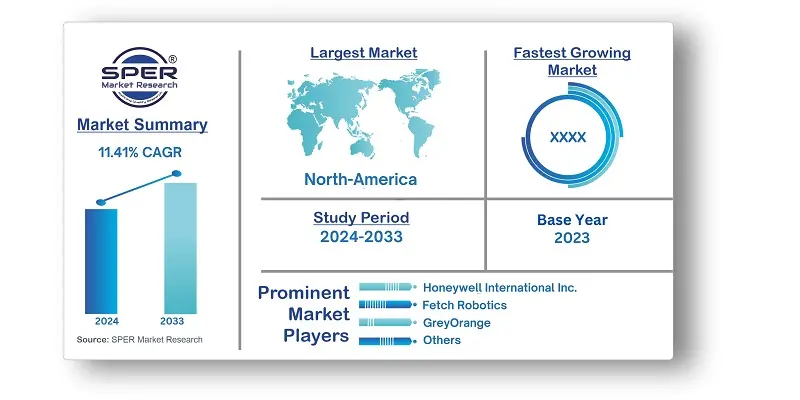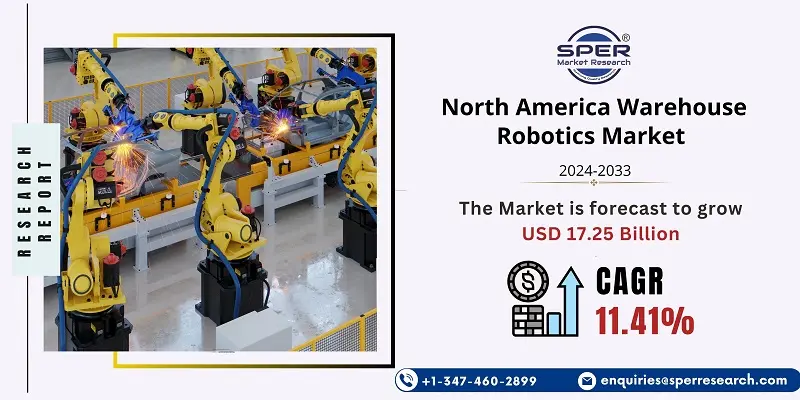
North America Warehouse Robotics Market Growth, Size, Trends, Demand and Future Outlook
North America Warehouse Robotics Market Size- By Type, By Function, By End User- Regional Outlook, Competitive Strategies and Segment Forecast to 2033
| Published: Jul-2024 | Report ID: AMIN24164 | Pages: 1 - 157 | Formats*: |
| Category : Automotive & Transportation | |||
- March 2024; The new Locus Vector and Locus Max robots from Locus Robotics are intended to handle larger payloads and enhance the company's warehouse automation capabilities.
- December 2023; Vecna Robotics deployed its autonomous pallet trucks around several distribution sites by teaming up with a significant North American 3PL supplier. The objectives of this collaboration are to save labor expenses and improve material handling efficiency. The 3PL provider anticipates increased throughput and operational agility thanks to Vecna's autonomous solutions.

Market Opportunities and Challenges

| Report Metric | Details |
| Market size available for years | 2020-2033 |
| Base year considered | 2023 |
| Forecast period | 2024-2033 |
| Segments covered | By Type, By Function, By End User |
| Regions covered | Canada, Mexico United States, Cuba, Panama, Greenland, Rest of North America |
| Companies Covered | 6 River Systems (Shopify), Fetch Robotics, GreyOrange, Honeywell International Inc., InVia Robotics Inc., Knapp AG, Kiva Systems (Amazon Robotics LLC), Locus Robotics, Omron Adept Technologies, Vecna Robotics, Others |
- E-commerce Companies
- Retail Chains
- Manufacturers
- Warehousing and Distribution Centers
- Automotive Industry
- Aerospace and Defence Industry
| By Type: |
|
| By Function: |
|
| By End User: |
|
- North America Warehouse Robotics Market Size (FY’2024-FY’2033)
- Overview of North America Warehouse Robotics Market
- Segmentation of North America Warehouse Robotics Market by Type (Industrial Robots, Sortation Systems, Conveyors, Palletizers, Automated Storage and Retrieval System)
- Segmentation of North America Warehouse Robotics Market by Function (Storage, Packaging, Trans-Shipments, Others)
- Segmentation of North America Warehouse Robotics Market by End User (Food and Beverage, Automotive, Retail, Electrical and Electronics, Others)
- Statistical Snap of North America Warehouse Robotics Market
- Expansion Analysis of North America Warehouse Robotics Market
- Problems and Obstacles in North America Warehouse Robotics Market
- Competitive Landscape in the North America Warehouse Robotics Market
- Impact of COVID-19 and Demonetization on North America Warehouse Robotics Market
- Details on Current Investment in North America Warehouse Robotics Market
- Competitive Analysis of North America Warehouse Robotics Market
- Prominent Players in the North America Warehouse Robotics Market
- SWOT Analysis of North America Warehouse Robotics Market
- North America Warehouse Robotics Market Future Outlook and Projections (FY’2024-FY’2033)
- Recommendations from Analyst
1.1. Scope of the report1.2. Market segment analysis
2.1. Research data source2.1.1. Secondary Data2.1.2. Primary Data2.1.3. SPER’s internal database2.1.4. Premium insight from KOL’s2.2. Market size estimation2.2.1. Top-down and Bottom-up approach2.3. Data triangulation
4.1. Driver, Restraint, Opportunity and Challenges analysis4.1.1. Drivers4.1.2. Restraints4.1.3. Opportunities4.1.4. Challenges4.2. COVID-19 Impacts of the North America Warehouse Robotics Market.
5.1. SWOT Analysis5.1.1. Strengths5.1.2. Weaknesses5.1.3. Opportunities5.1.4. Threats5.2. PESTEL Analysis5.2.1. Political Landscape5.2.2. Economic Landscape5.2.3. Social Landscape5.2.4. Technological Landscape5.2.5. Environmental Landscape5.2.6. Legal Landscape5.3. PORTER’s Five Forces5.3.1. Bargaining power of suppliers5.3.2. Bargaining power of buyers5.3.3. Threat of Substitute5.3.4. Threat of new entrant5.3.5. Competitive rivalry5.4. Heat Map Analysis
6.1. North America Warehouse Robotics Market Manufacturing Base Distribution, Sales Area, Product Type6.2. Mergers & Acquisitions, Partnerships, Product Launch, and Collaboration in North America Warehouse Robotics Market
7.1. North America Warehouse Robotics Market Size, Share and Forecast, By Type, 2020-20267.2. North America Warehouse Robotics Market Size, Share and Forecast, By Type, 2027-20337.3. Industrial Robots7.4. Sortation Systems7.5. Conveyors7.6. Palletizers7.7. Automated Storage and Retrieval System7.8. Mobile Robots
8.1. North America Warehouse Robotics Market Size, Share and Forecast, By Function, 2020-20268.2. North America Warehouse Robotics Market Size, Share and Forecast, By Function, 2027-20338.3. Storage8.4. Packaging8.5. Trans-Shipments8.6. Others
9.1. North America Warehouse Robotics Market Size, Share and Forecast, By End User, 2020-20269.2. North America Warehouse Robotics Market Size, Share and Forecast, By End User, 2027-20339.3. Food and Beverage9.4. Automotive9.5. Retail9.6. Electrical and Electronics9.7. Others
10.1. North America Warehouse Robotics Market Size and Market Share
11.1. North America Warehouse Robotics Market Size and Market Share By Region (2020-2026)11.2. North America Warehouse Robotics Market Size and Market Share By Region (2027-2033)11.3. North America11.3.1. Canada11.3.2. Mexico11.3.3. United States11.3.4. Cuba11.3.5. Panama11.3.6. Greenland11.3.7. Rest of North America
12.1. 6 RIVER SYSTEMS12.1.1. Company details12.1.2. Financial outlook12.1.3. Product summary12.1.4. Recent developments12.2. FETCH ROBOTICS12.2.1. Company details12.2.2. Financial outlook12.2.3. Product summary12.2.4. Recent developments12.3. GREYORANGE12.3.1. Company details12.3.2. Financial outlook12.3.3. Product summary12.3.4. Recent developments12.4. HONEYWELL INTERNATIONAL INC.12.4.1. Company details12.4.2. Financial outlook12.4.3. Product summary12.4.4. Recent developments12.5. INVIA ROBOTICS INC.12.5.1. Company details12.5.2. Financial outlook12.5.3. Product summary12.5.4. Recent developments12.6. KNAPP AG12.6.1. Company details12.6.2. Financial outlook12.6.3. Product summary12.6.4. Recent developments12.7. KIVA SYSTEMS12.7.1. Company details12.7.2. Financial outlook12.7.3. Product summary12.7.4. Recent developments12.8. LOCUS ROBOTICS12.8.1. Company details12.8.2. Financial outlook12.8.3. Product summary12.8.4. Recent developments12.9. VECNA ROBOTICS12.9.1. Company details12.9.2. Financial outlook12.9.3. Product summary12.9.4. Recent developments12.10. Others
SPER Market Research’s methodology uses great emphasis on primary research to ensure that the market intelligence insights are up to date, reliable and accurate. Primary interviews are done with players involved in each phase of a supply chain to analyze the market forecasting. The secondary research method is used to help you fully understand how the future markets and the spending patterns look likes.
The report is based on in-depth qualitative and quantitative analysis of the Product Market. The quantitative analysis involves the application of various projection and sampling techniques. The qualitative analysis involves primary interviews, surveys, and vendor briefings. The data gathered as a result of these processes are validated through experts opinion. Our research methodology entails an ideal mixture of primary and secondary initiatives.



Frequently Asked Questions About This Report
PLACE AN ORDER
Year End Discount
Sample Report
Pre-Purchase Inquiry
NEED CUSTOMIZATION?
Request CustomizationCALL OR EMAIL US
100% Secure Payment






Related Reports
Our Global Clients
Our data-driven insights have influenced the strategy of 200+ reputed companies across the globe.






















